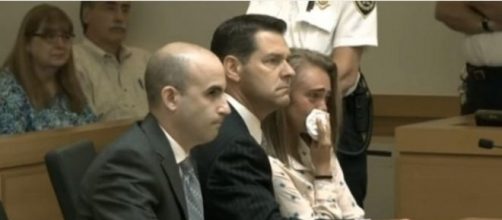Judge Lawrence Moniz rendered a guilty verdict in the potentially precedent-setting involuntary manslaughter Case against 20-year-old Michelle Carter. Following her conviction today, Carter faces up to 20 years in prison following the trial in Bristol Juvenile Court, Taunton, MA. She was found criminally liable following the 2014 suicide of her 18-year-old boyfriend Conrad Roy III. He took his own life as a result of carbon monoxide poisoning filling the cab of his pickup truck.
Judge Moniz stated that Roy’s girlfriend, who was 17-years-old at the time of his death, was mindful that the lethal gas would take around 15 minutes to build to a toxic level in Roy’s F-250 truck.
When Roy left the truck, as it was filling with deadly poisonous fumes, Carter persuaded her boyfriend to get back in the truck.
The judge also said that Carter encouraged her boyfriend to follow through with suicide while fully aware of his previous failed suicide attempts, including when he tried over-dosing and when he tried downing himself. In swaying Roy to sit in the truck, it constituted “wanton and reckless conduct,” which created a high probability the end result would be substantial harm.
While knowing Roy’s plan to take his own life and the location, throughout a series of text messages and phone call conversations, Carter neither called his family nor the police, Moniz said. She didn’t express an added instruction, “Get out of the truck,” the judge stated.
Judge restricts convicted Carter from texting and using social media
While Carter will remain out of custody on bail to await sentencing on August 3, the judge ordered her not to leave Massachusetts or obtain a passport without the court’s approval. He also prohibited her from texting, using social media, and contacting Roy’s family or witnesses in the case.
During the pronouncement of the judge’s verdict, Carter stood to receive his ruling. She has maintained her innocence throughout the trial.
Roy’s family was seated near Carter in the front row of the courtroom. They wept as the judge reviewed Carter’s complicity in her boyfriend’s death, as well as the steps Roy took and which ended his life.
In the defense’s closing argument on Tuesday, her attorney argued that Carter lived 30 miles from where the suicide happened and, because of that fact, she should not be convicted.
The prosecution, however, stated that the court never required a person’s actual presence to commit a crime. As well, prosecutors countered that Carter was “in his ear” while knowing he was going to die. She did it to garner attention, to assume the role as a grief-struck girlfriend, and to bolster her social status.
Even though Carter was still a minor at the time of Roy’s death, she was charged as a youthful offender and will be sentenced as an adult. She waived her right to trial by jury and, instead, relied on the lone decision of the judge.
Impact of verdict on criminal liability in Massachusetts
Dan Cevallos, CNN legal analyst, said the guilty verdict is not surprising when considered in conjunction with the “expansive definition” of manslaughter under the law in Massachusetts. Concerning is how Cevallos described the guilty verdict, reflecting a “judicial willingness” to broaden legal liability when another person commits suicide. He also explained that suicide is an “independent choice” and, historically, it has been a “superseding act,” breaking the chain of legal causation.
Daniel Medwed, a professor of law at Northeastern University, stated before the judge gave his ruling, that there is a wrinkle. The question is whether Carter pressured Roy into doing something that he wasn’t in a capacity to rationally and independently decide while in a depressive state. According to him, the manslaughter charge was not a “perfect fit.”


